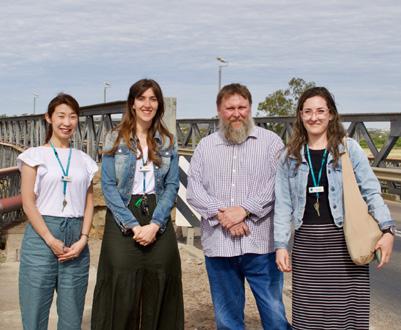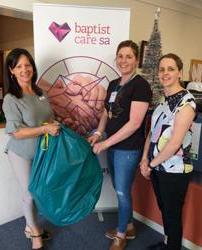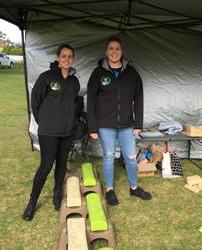
4 minute read
Relationship Support Services
Catalyst for change
Lisa Osborne | Executive Manager
One year on from the onset of the pandemic that changed the world, Relationship Support Services (RSS) continues to cleverly adapt supports to meet emerging needs.
When COVID-19 hit in 2020, families, individuals and children felt the pinch of a very new way of life. A year later, the strange is more familiar but the demand to adapt and innovate services remains.
Far from abating, the challenges facing regional and metropolitan clients continues to grow in complexity, demanding a renewed resolve from the staff that support them.
To address declining mental health triggered by COVID-19 in children aged 0-12 years, SA Health allocated $50,000 to augment Centacare's capacity to support young clients through existing counselling services. Children have used the support to share their feelings and fears about the pandemic.
Demand continues to rise for mediation, family counselling, parenting education, and relationship and post-separation courses.
A commitment to integrated collaboration and resource sharing saw RSS actively continue to participate in sector networks and partnerships across the state in 2020-21.
We welcomed new schools into the School Counselling Service and National School Chaplaincy Program and, in collaboration with AnglicareSA, delivered Women Are Strong groups at Taikurrendi Children and Family Centre at Christies Beach, and Metropolitan Youth Health Service at Hackham West.
In partnership with the Internships and Work Integrated Learning (IWIL) Faculty of Arts at the University of Adelaide, RSS commissioned an evaluation project for Women Are Strong and we keenly await this research.
RSS continues to be a strong voice for reconciliation and cultural awareness through attendance at NAIDOC and Reconciliation Week events, and representation on Joining Hands and Minds - a coalition of Aboriginal groups and service providers which works to support and develop Aboriginal children and families in the south of Adelaide. In February this year, a Welcome to Country Kaurna language workshop was held at Wandana Community Centre, facilitated by Uncle Frank Wanganeen in collaboration with Morella Community Centre.
More than 100 children shared in the fun of a family day, sponsored by the Morialta Trust, at Wandana, while 162 families attended the Supporting Sole Parents Annual Christmas Party, funded by Variety, the Children's Charity.
We welcomed the announcement of five-year funding through the Department of Social Services for Family Relationship Counselling and Supporting Children and Youth, and two-year funding for the Family Connections Program in Mount Gambier.
An additional 12-month funding provided by our Communities for Children Facilitating Partners - Anglicare and ac.care Murraylands - will enable our Fathers and Families and Mobile Family Connections programs to continue providing flexible and creative family-based programs at Murray Bridge and Southern Adelaide respectively.
Other highlights included Circle of Security training for counsellors, disability inclusion training at Wandana Community Centre facilitated by Purple Orange, and continued collaboration with Emerging Minds.
Sadly, June 30 marked the end of Sun Dancing which, for 25 years, provided specialist support for victims of child sexual abuse and their families.
I would like to thank and acknowledge our state and federal funders, and the staff, volunteers and students on placement who, under the stewardship of RSS managers, provide steadfast support to our clients throughout the year.



Young people voice concerns
Growing numbers of children aged under 12 years are accessing Centacare counselling support for mental health challenges arising from COVID-19.
In recent months, Centacare Children's Counsellor Jessica Sinclair has worked with children as young as six years who are experiencing anxiety, safety concerns and other worries triggered by stress on their families arising from the pandemic.
Parents report their children are happier, calm and are sleeping better since accessing the free counselling, which is funded by SA Health through the Virtual Support Network and offered across metropolitan Adelaide and the South-East.
Jessica said outreach and telephone appointments had helped families living on the outskirts of Mount Gambier to access support in the face of transport, financial and geographical barriers.
"The sessions have helped children to recognise how they are feeling and to understand why they are feeling that way," she said.
"Children have reported elevated happiness levels, with behaviour changes demonstrated.
"Often parents and caregivers are unaware of the issues their children are facing, so the counselling has helped them to understand what is truly going on for their child and how they can best respond to their developmental needs."
Nearly 40 children have engaged with the counselling since it began in May.
Counselling Manager Sally McLaren said common COVID-19 related stressors for children include hypervigilance around hygiene and check-in codes, sleeplessness, fear of the unknown, and worries "they've never had before".
"A lot of children are feeling the world is not safe. There is generalised anxiety about not knowing what's going to happen next," she said.










